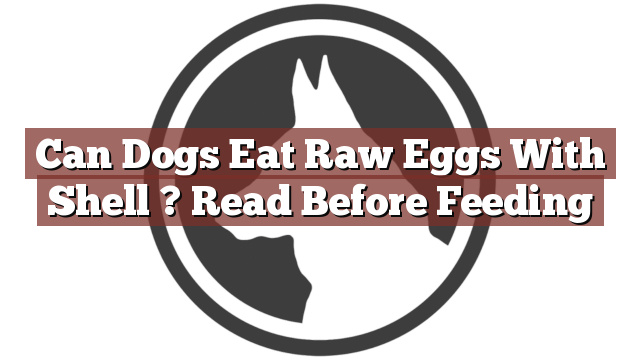Understanding Your Dog’s Dietary Needs
Proper nutrition is vital for our furry friends to maintain their overall health and well-being. As responsible pet owners, it is crucial to understand our dog’s dietary needs and ensure they receive a balanced diet. Dogs require a combination of proteins, fats, carbohydrates, vitamins, and minerals to thrive. While commercial dog food offers a convenient option to meet these requirements, some owners may be tempted to supplement their dog’s diet with other foods, such as raw eggs with shells. But, is it safe?
Can Dogs Eat Raw Eggs With Shell? Read Before Feeding
Can dogs eat raw eggs with the shell? The short answer is yes, dogs can eat raw eggs with the shell. However, it is essential to consider a few factors before adding this to your pet’s diet. Raw eggs can be a great source of protein and essential fatty acids for dogs. The shell provides calcium, which is beneficial for their bones and teeth. Additionally, eggs contain vitamins such as A, B12, and D, as well as minerals like selenium and iron.
However, there are potential risks associated with feeding raw eggs to dogs. Raw eggs may contain salmonella or E. coli, which can lead to digestive upset or even more severe illnesses. Furthermore, the avidin protein found in raw egg whites can interfere with the absorption of biotin, causing a deficiency. Therefore, it is crucial to take precautionary measures and consult with your veterinarian before introducing raw eggs with the shell into your dog’s diet.
Pros and Cons of Feeding Raw Eggs with Shell to Your Dog
Feeding your dog raw eggs with the shell does have some potential benefits. The high protein content can support muscle development and repair, making it an excellent option for active dogs. The fatty acids in eggs contribute to healthy skin and a shiny coat. Calcium from the shell aids in maintaining strong bones and teeth. Moreover, the vitamins and minerals present in eggs can boost your dog’s immune system and overall health.
However, there are also drawbacks to consider. The risk of bacterial contamination, especially from salmonella or E. coli, is a significant concern. Dogs with compromised immune systems, puppies, or senior dogs may be more vulnerable to such infections. Another important factor to note is the potential biotin deficiency caused by the avidin protein in raw egg whites. This deficiency can lead to skin and coat issues, as well as problems in your dog’s metabolism.
Conclusion: Weighing the Benefits and Risks of Raw Eggs for Dogs
Can a dog eat raw eggs with the shell? Yes, but it is essential to weigh the benefits against the risks before making a decision. While raw eggs with the shell can provide valuable nutrients to your dog, the potential for bacterial contamination and biotin deficiency should not be overlooked. If you choose to feed your dog raw eggs, it is crucial to ensure they come from reputable sources and are handled safely. Consulting with your veterinarian is highly recommended to determine if this addition aligns with your dog’s specific dietary needs. Remember, the well-being and health of your furry companion should always be the top priority.
Thank you for taking the time to read through our exploration of [page_title]. As every dog lover knows, our furry friends have unique dietary needs and responses, often varying from one canine to another. This is why it's paramount to approach any changes in their diet with caution and knowledge.
Before introducing any new treats or making alterations to your dog's diet based on our insights, it's crucial to consult with a veterinarian about [page_title]. Their expertise ensures that the choices you make are well-suited to your particular pet's health and well-being.
Even seemingly harmless foods can sometimes lead to allergic reactions or digestive issues, which is why monitoring your dog after introducing any new food item is essential.
The content provided here on [page_title] is crafted with care, thorough research, and a genuine love for dogs. Nevertheless, it serves as a general guideline and should not be considered a substitute for professional veterinary advice.
Always prioritize the expert insights of your veterinarian, and remember that the health and happiness of your furry companion come first.
May your journey with your pet continue to be filled with joy, love, and safe culinary adventures. Happy reading, and even happier snacking for your canine friend!

